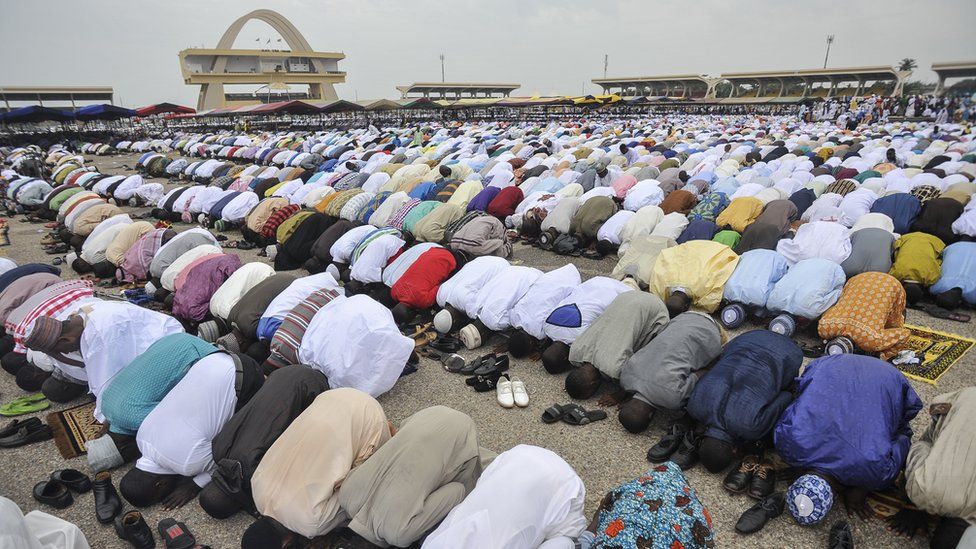How will coronavirus affect this year’s Ramadan?
Thursday, April 23, marks the beginning of one of the most sacred months on the Islamic calendar—Ramadan.
But this year’s one-month fasting and prayer—one of the pillars of Islam will never be the same.
With mosques in the country closed due to the coronavirus outbreak and the government directive that bans social gatherings, the country’s Moslems will have to devise alternative means to live up to the faiths call to Ramadan duty.
So what is likely to change or remain the same in this era when the coronavirus is running amok in Ghana and across the world?
What is Ramadan and how is it normally celebrated?
The month-long fasting period starts on April 23 and ends on May 23, During the period, the faithful fast during the daylight hours. They can eat before sunrise and break their fast after dusk each day.

Moslems believe their Holy Book, the Quran, was revealed to the Prophet Mohammed during this holy month. Besides abstinence from food and water, Moslems are asked to abstain from sexual intercourse as well.
During the month, Moslems also try to practice “zakat,” or charity, another one of the five pillars of Islam.
The Arabic etymology of Ramadan references extreme heat. Fasting therefore becomes the spiritual process of burning away sin with good deeds.
During Ramadan, two main meals are served to begin and end the daytime fast. “Suhoor” is served and eaten before dawn, and “iftar,” is served and eaten after sunset. Typically, these meals are enjoyed in group gatherings among family and friends.
Ramadan in the age of coronavirus
Islamic holy sites, including Mecca and Medina in Saudi Arabia and Al-Aqsa mosque in Jerusalem, will be empty during Ramadan after authorities advised worshipers to pray at home.
The Al-Aqsa Mosque compound in Jerusalem — Islam’s third holiest place — will also remain closed during Ramadan, the Jerusalem Islamic Waqf Council said Thursday.
For Muslims, a big part of the holy month consists of special night prayers called “taraweeh,” which are held daily at the mosque and performed by the imam, the mosque’s prayer leader.
Historically speaking, mosques are packed with worshipers during the month of Ramadan.
The night prayer can be performed at the mosque or at home, there’s no difference in the validity between the two.
But in Ghana, there are also gatherings under the feet of Islamic clerics who take the faithful through teachings, but all that has been frozen this year.
However, a few tech-savvy Ghanaian Moslem youths are thinking about virtual worship just as their Christian counterparts live stream Sunday and midweek services.
The last day
Eid al-Fitr, the last day of Ramadan, is considered one of the most important days for Moslems. The holiday is known as the “festival of breaking the fast.”
During the day, Muslims gather in large open spaces or mosques for special prayers, called Salat al-Eid, which are usually followed by their first daytime meal in a month.
In Ghana, these huge gatherings are hosted at the Independence Square in Accra and the Jubilee Parks across the country and parks in district capitals.

Almsgiving is also a common practice. Another custom involves donning new clothes for the day, which marks a spiritual renewal.
Food is an important part of Eid al-Fitr, as feasting takes the place of fasting with community members, family and friends.
In some Zongo communities, including Nima and Ashaiman, huge jams, popularly known as Salafest, take place. But with the deadly coronavirus lurking almost everywhere against the backdrop of the government’s ban on social distancing, that is not likely to happen this year.
Perhaps there might be a virtual concert in the offing. Shatta Wale has single-handedly done that for his fans already. So did the Ministry of Communications, host one to launch the coronavirus tracker app.
While there might not be the huge numbers in the streets and mosques, the spiritual value of the month-long
“We are not in ordinary times, but we must not lose the sanctity of Ramadan. It’s a holy month, it’s a month of discipline. Let’s respect the law and save our lives,” Razak Alhassan, said.



